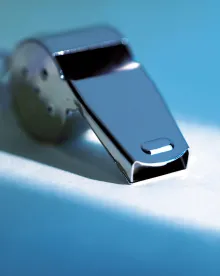A California jury has awarded former Bio-Rad Laboratories Inc. General Counsel Sanford Wadler $8M in his Sarbanes-Oxley whistleblower retaliation lawsuit. Approximately $3M of the award is for back pay and the remaining amount is for punitive damages. Wadler is represented by Kerr & Wagstaff. The jury instructions are available here.
Wadler worked as GC at Bio-Rad for approximately 25 years. He blew the whistle internally by reporting potential violations of the Foreign Corrupt Practices Act (“FCPA”). Bio-Rad investigated Wadler’s disclosures and concluded that there was no evidence of either a violation or an attempted violation of the FCPA. In June 2013, Bio-Rad terminated Wadler’s employment due to alleged poor work performance and behavior.
Prior to the trial, Wadler obtained an important ruling permitting him to use privileged communications and confidential information that is “reasonably necessary” to establish his claim. The ruling is available here.
The jury verdict in the Wadler SOX case appears to be the highest award to date under the whistleblower protection provision of SOX. There are approximately three other SOX whistleblower cases that resulted in damages in excess of $2M:
-
In 2014, a California jury awarded $6 million to Catherine Zulfer in her SOX whistleblower retaliation action against Playboy, Inc. (“Playboy”). Zulfer v. Playboy Enters. Inc., JVR No. 1405010041, 2014 WL 1891246 (C.D. Cal. Mar. 5, 2014). Zulfer, a former accounting executive, alleged that Playboy had terminated her in retaliation for raising concerns about executive bonuses to Playboy’s chief financial officer (“CFO”) and chief compliance officer (“CCO”). She contended that she had been instructed by Playboy’s CFO to set aside $1 million for executive bonuses that had not been approved by the board of directors. Zulfer refused to carry out this instruction, warning Playboy’s General Counsel that the bonuses were contrary to Playboy’s internal controls over financial reporting. After Zulfer’s disclosure, the CFO retaliated by ostracizing Zulfer, excluding her from meetings, forcing her to take on additional duties, and eventually terminating her employment. After a short trial, a jury awarded Zulfer $6 million in compensatory damages and also ruled that Zulfer was entitled to punitive damages. Id. Zulfer and Playboy reached a settlement before a determination of punitive damages.
-
In 2016, Dr. Perez, a former senior manager of pharmaceutical chemistry at Progenics Pharmaceuticals, Inc. (“Progenics”), recovered a total of $5M in a SOX whistleblower case. Perez alleged that Progenics terminated his employment in retaliation for his disclosure to Progenics executives that the company was committing fraud against shareholders by making inaccurate representations about the results of a clinical trial. Dr. Perez represented himself at trial. Corporate Counsel magazine reported on the case in an article titled: How to Help a Whistleblower.
-
In 2013, the Ninth Circuit affirmed a SOX jury verdict awarding $2.2 million in damages, plus $2.4 million in attorney’s fees, to two former in-house counsel. Van Asdale v. Int’l Game Tech., 549 F. App’x 611, 614 (9th Cir. Sept. 27, 2013). Shawn and Lena Van Asdale, both former in-house counsel at International Game Technology (“IGT”), alleged that they had been terminated in retaliation for disclosing shareholder fraud related to IGT’s merger with rival game company Anchor Gaming (“Anchor”). Specifically, the Van Asdales alleged that Anchor had withheld important information about its value, causing IGT to commit shareholder fraud by paying above market value to acquire Anchor. Van Asdale v. Int’l Game Tech., 577 F.3d 989, 992 (9th Cir. 2009). When the Van Asdales discovered the issue, they brought their concerns about the potential fraud to their boss, who had served as Anchor’s general counsel prior to the merger. IGT terminated both plaintiffs shortly thereafter.
These SOX jury verdicts highlight the importance of the removal or “kick out” provision in SOX, which authorizes SOX whistleblowers to remove their claims from the DOL to federal court for de novo review 180 days after filing the complaint with OSHA. Although SOX does not authorize punitive damages, a SOX complainant in federal court can add claims for which punitive damages can be recovered. And there is no cap on special damages (damages for reputational harm and emotional distress) under SOX.



 />i
/>i

